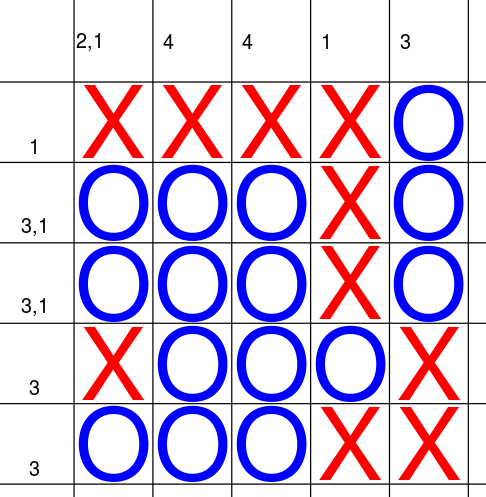Solutions of Shady Puzzles HD! app
为了多凑几篇博文,同时也不忍让某些代码在硬盘中发霉,准备把已经躺了四个月的计算Shady Puzzle HD!结果的代码发上来。方法比较原始,很烦很暴力的穷举法,稍微减少了判断的次数,没开并行。
效果是这样的:

代码
decompos<- function(number,groups) {
res<- matrix(nrow=0,ncol=groups)
if(groups<1) stop("Parameter 'groups' MUST BE >=1")
if(groups==1) {
res<- rbind(res,number)
}else{
for(i in 0:number) {
tmp<- c(i,number-i)
if(length(tmp)<groups) {
tmp2<- decompos(number-i,groups-1)
tmp<- cbind(matrix(rep(i,nrow(tmp2)),ncol=1),tmp2)
}
res<- rbind(res,unname(tmp))
}
}
colnames(res)<- paste('Group.',1:ncol(res),sep='')
rownames(res)<- paste('Method.',1:nrow(res),sep='')
return(res)
}
no.cond.init<- function(yes.cond) {
row.num<- length(yes.cond$row)
col.num<- length(yes.cond$col)
no.cond<- list(row=rep(list(NULL),row.num),col=rep(list(NULL),col.num))
cond.len<- lapply(yes.cond,function(x) unlist(lapply(x,function(y) ifelse(identical(y,0),1,1+length(y)))))
for(i in 1:row.num) no.cond$row[i]<- list(rep(1,cond.len$row[i]))
for(i in 1:col.num) no.cond$col[i]<- list(rep(1,cond.len$col[i]))
no.cond$row<- lapply(no.cond$row,
function(x) {
if(length(x)>1) {
x[1]<- x[length(x)]<- 0
}else{
x<- col.num
}
return(x)
})
no.cond$col<- lapply(no.cond$col,
function(x) {
if(length(x)>1) {
x[1]<- x[length(x)]<- 0
}else{
x<- row.num
}
return(x)
})
return(no.cond)
}
get.freedom<- function(curr.yes,curr.no) {
row.num<- length(curr.yes$row)
col.num<- length(curr.yes$col)
degree<- list(row=rep(NA,row.num),col=rep(NA,col.num))
for(i in 1:row.num) degree$row[i]<- col.num-sum(curr.yes$row[[i]],curr.no$row[[i]])
for(i in 1:col.num) degree$col[i]<- row.num-sum(curr.yes$col[[i]],curr.no$col[[i]])
return(degree)
}
gen.candidate<- function(curr.no,curr.freedom) {
row.num<- length(curr.no$row)
col.num<- length(curr.no$col)
candidate<- list(row=rep(list(NULL),row.num),col=rep(list(NULL),col.num))
for(i in 1:row.num) candidate$row[i]<- list(decompos(curr.freedom$row[i],length(curr.no$row[[i]])))
for(i in 1:col.num) candidate$col[i]<- list(decompos(curr.freedom$col[i],length(curr.no$col[[i]])))
return(candidate)
}
fill.board<- function(yes.cond,no.cond,candi) {
row.num<- length(candi$row)
col.num<- length(candi$col)
candi.num<- lapply(candi,function(x) unlist(lapply(x,function(y) nrow(y))))
total.num<- unlist(lapply(candi.num,prod))
fill.direction<- which.min(total.num)
fill.candi<- candi[[fill.direction]]
fill.order<- order(candi.num[[fill.direction]])
solution<- rep(list(NULL),length(candi[[fill.direction]]))
res<- fill.recursive(solution,fill.order,fill.candi,yes.cond[[fill.direction]],no.cond[[fill.direction]],yes.cond[[-fill.direction]])
cat('\n')
if(res$solved==T) {
cat("*** Problem solved! ***\n")
dim.names<- lapply(yes.cond,function(x) unlist(lapply(x,function(y) paste(y,collapse=','))))
if(fill.direction==1) {
solution<- do.call(rbind,res$solution)
dimnames(solution)<- dim.names
return(solution)
}else{
solution<- do.call(cbind,res$solution)
dimnames(solution)<- dim.names
return(solution)
}
}else{
cat("*** No solutions ***\n")
}
return(NULL)
}
fill.recursive<- function(curr.sol,fill.order,curr.candi,yes.list,no.list,check.cond) {
num<- length(curr.sol)
num.to.fill<- sum(unlist(lapply(curr.sol,is.null)))
if(num.to.fill==0) {
# All filled, check it!
if(exists('tried')==T) {
tried<<- tried+1
if(all.shots>20) {
if(tried%%floor(all.shots/20)==0) cat("=> ",tried/floor(all.shots/20)*5,'% ',sep='')
}
}
if(check.board(curr.sol,check.cond)==TRUE) {
# Find solution
return(list(solved=T,solution=curr.sol,candidate=curr.candi))
}else{
return(list(solved=F,solution=NULL,candidate=NULL))
}
}else{
curr.id<- fill.order[num-num.to.fill+1]
for(i in 1:nrow(curr.candi[[curr.id]])) {
curr.sol[[curr.id]]<- parse.solution(yes.list[[curr.id]],no.list[[curr.id]]+curr.candi[[curr.id]][i,])
res<- fill.recursive(curr.sol,fill.order,curr.candi,yes.list,no.list,check.cond)
if(res$solved==T) return(list(solved=T,solution=res$solution,candidate=res$candidate))
}
return(list(solved=F,solution=NULL,candidate=NULL))
}
stop("No return!")
}
check.board<- function(solution,check.cond) {
sol.mat<- do.call(cbind,solution)
flag<- T
for(i in 1:length(check.cond)) {
tmp<- unlist(strsplit(paste(sol.mat[i,],collapse=''),'0'))
tmp<- tmp[tmp!='']
sol.str<- paste(nchar(tmp),collapse=',')
sol.str<- ifelse(sol.str=='','0',sol.str)
chk.str<- paste(check.cond[[i]],collapse=',')
if(sol.str!=chk.str) {
flag<- F
break
}
}
# cat('\n\n')
return(flag)
}
parse.solution<- function(yes.vec,no.vec) {
len<- length(yes.vec)+length(no.vec)
sol<- rep(NA,sum(yes.vec,no.vec))
for(i in 1:len) {
if(i%%2==1) {
if(no.vec[ceiling(i/2)]!=0) sol[seq(from=which(is.na(sol))[1],by=1,length=no.vec[ceiling(i/2)])]<- 0
}else{
sol[seq(from=which(is.na(sol))[1],by=1,length=yes.vec[ceiling(i/2)])]<- 1
}
}
return(sol)
}
solve.game<- function(conditions) {
yes.cond<- conditions
no.cond<- no.cond.init(yes.cond)
freedom<- get.freedom(yes.cond,no.cond)
candidate<- gen.candidate(no.cond,freedom)
print(sprintf("At most %d possibilities",all.shots<<- min(unlist(lapply(lapply(candidate,function(x) unlist(lapply(x,function(y) nrow(y)))),prod)))))
tried<<- 0
cat('0% ',sep='')
print(system.time(res<- fill.board(yes.cond,no.cond,candidate)))
print(sprintf("Tried: %d",tried))
print(res)
plot.game(res)
return(res)
}
plot.game<- function(solution) {
row.num<- nrow(solution)
col.num<- ncol(solution)
plot(0,0,type='n',xlim=c(-1,col.num),ylim=c(0,row.num+1),xlab='',ylab='',asp=1)
abline(v=0:col.num,h=0:row.num)
text(-0.5,(1:row.num)-0.8,rownames(solution))
text((1:col.num)-0.8,row.num+0.5,colnames(solution))
for(i in 1:row.num) {
for(j in 1:col.num) {
symbol<- ifelse(solution[i,j]==1,'O','X')
color<- ifelse(solution[i,j]==1,'blue','red')
text(-0.5+j,0.5+(row.num-i),symbol,cex=5,col=color)
}
}
}
solution<- solve.game(list(row=list(1,c(3,1),c(3,1),3,3),col=list(c(2,1),4,4,1,3)))
blog comments powered by Disqus